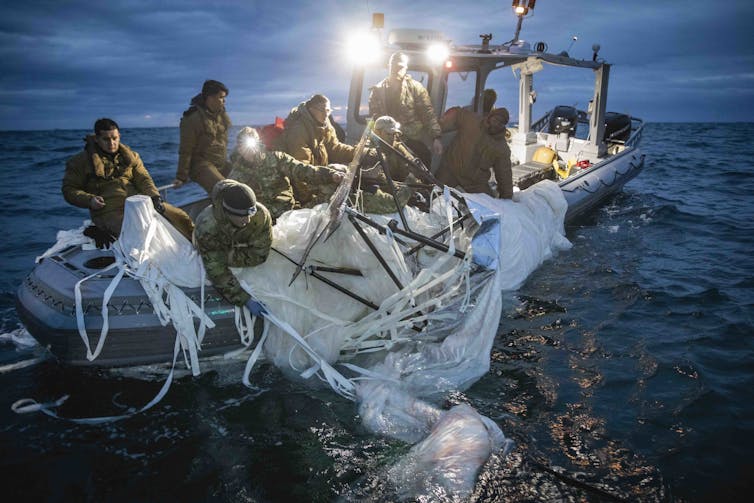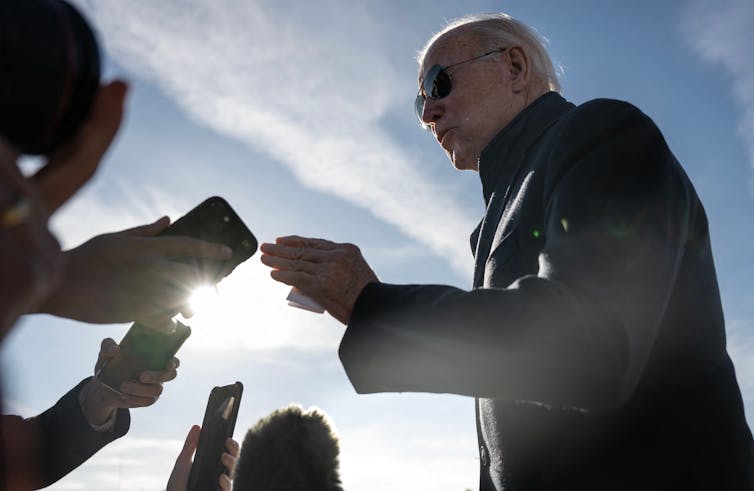Spy balloon drama elevates public attention, pressure for the US to confront China
Espionage routinely plays out between countries like the US and China. But a public spectacle like the Chinese spy balloon can change the game.

Seven days after a Chinese spy balloon began drifting across the United States, the U.S. military downed it with a single missile.
But the balloon, in a sense, continues its flight through diplomatic circles, complicating U.S.-China relations amid rising tensions.
One consequence is that the balloon may help shift how Americans view China.
We are political science scholars and U.S. foreign policy experts who recently published a book about U.S. overseas military deployments. In it, we discuss how U.S. military bases might change with a more powerful China expanding its influence.
The balloon incident is an example of mounting tensions and espionage between China and the U.S. – but it is different largely because it took place in public, occurred over U.S. territory and the subsequent diplomatic tiff received a lot of media coverage.

Spying is routine
China’s surveillance balloon entered U.S. airspace over the Aleutian Islands in Alaska on Jan. 28, 2023, and then made its way to Montana. On Feb. 3, as Montana residents spotted and asked questions about this “weird thing” in the sky, U.S. officials publicly acknowledged the balloon. That same day, Secretary of State Anthony Blinken canceled an upcoming diplomatic trip to Beijing.
A United States Air Force F-22 Raptor shot down the balloon with a missile off the coast of South Carolina on Feb. 4.
Recently, senior U.S. defense officials acknowledged that China had targeted several countries worldwide in a similar way over recent years.
While public awareness of specific cases might be new, spying between countries is not. The U.S. has been both the target and the agent of an increasing amount of espionage.
Countries routinely spy on one another to gather information. In fact, governments often rely on secret agents to collect and report information about both their rivals and allies. In other cases, they may monitor electronic communications. Wealthier countries may also use high-altitude surveillance aircraft, like the balloon China floated over the U.S., or orbiting satellites to collect photographic or other intelligence on various targets.
In some cases, governments may want information on enemy troop positions or movements. They may also want information on other aspects of their enemy’s capabilities. For example, several U.S. officials expressed concern that one suspected target of the Chinese spy balloon was Malmstrom Air Force Base in Montana, which houses nuclear missile silos.
Espionage can make war less likely
Countries care about gathering information on each other because it can give them an advantage over their rivals. But rivals having more information is not always a bad thing.
In political science, we often think of conflict as a bargain over how to divide something – be it territory and resources, or policy and political control.
War often happens when states cannot agree on dividing these types of things. The problem is that war can be an inefficient way of resolving disputes because it destroys resources – both wealth and often human lives.
Why, then, do countries fight wars?
One argument is that countries may have different information from their opponents. They may overestimate their capabilities or underestimate those of the opponent.
Because countries generally have an incentive to bluff or act stronger than they really are, they also have the incentive to gather private information from their rivals.
Espionage may then serve the purpose of making the probability of war less likely by preventing miscalculations. It lets governments gain information about each other without pressure from hawkish groups to escalate confrontations.
We know also know from our research that the U.S. sometimes willingly shares information about its own capabilities with rival militaries as a way to deter them from initiating conflict.
Under pressure
Before the balloon incident, much of the increasing tension between the U.S. and China had been relatively abstract or remote in most Americans’ eyes. But a Chinese spy balloon drifting directly over U.S. is a material object people saw with their own eyes.
Suddenly, the United States’ action – or inaction – over what to do with the balloon became a hotly debated topic. President Joe Biden’s Republican opponents criticized his timing as late in shooting down the balloon. Former President Donald Trump claimed that no such balloon would fly over the U.S. under his administration – despite evidence indicating three such balloons flew undetected at the time.
While Americans have become increasingly suspicious of China’s role in the world, the country has been divided on how the U.S. should confront the risk.
More than three-quarters of U.S. adults have expressed an unfavorable opinion of China since 2020, according to a Pew Research Center survey in September 2022. This number has continued to rise since 2005.
And in 2021, 45% of Americans said that China is the greatest enemy of the U.S. – more than double the percentage who said so in 2020, according to a Gallup poll.
The balloon, whatever the intent of those who launched it, left the U.S. little choice but to down it – in order to both end the balloon’s intelligence gathering and mollify domestic critics.
While China has asked for the balloon back intact, countries often pore over and examine captured spy and military equipment thoroughly before returning it to the country of origin. Some countries may even refuse to return seized equipment. The U.S. has said it will not return the balloon.
So while espionage can reduce the chances of conflict by providing more information on a rival’s capabilities, getting caught can affect other parts of the bargaining process that make conflict more likely. Public outcry may force leaders to take a harder stand in future interactions with their spying rival. At present, the balloon incident has deflated political support for further cooperation with China and increases the likelihood of further confrontation.

The latest incident between US and China
The balloon incident may have surprised the U.S. population, but it fits the recent pattern of interactions between the U.S. and China.
The Trump administration engaged in a trade war with China, and though there were some steps toward better relations with a new trade agreement, the emergence of COVID-19 created new conflict between the countries. China was not fully transparent about what happened early during the pandemic. Trump claimed to have evidence that the virus originated in a Chinese lab (though most scientists believe it to have had natural origins).
A few days before leaving office, Trump administration officials accused China of committing genocide against the Uyghurs – a Muslim ethnic minority group of people who predominantly live in China’s northwest.
While the Biden administration has seemed less confrontational toward China than the previous administration, it maintained many of the Trump-era policies on trade – keeping tariffs against China in place – and the Uyghurs. Biden signed a law in 2021 that prevents the import of any Chinese products made with forced labor by the more than 1 million Uyghur people that China has illegally detained.
Michael A. Allen has previously received funding from the Minerva Research Initiative, the Department of Defense, and the Army Research Office. Part of the work mentioned in here was funded by these organizations. The views expressed here are the authors' only and do not represent the views of any outside funder.
Carla Martinez Machain has previously received funding from the Minerva Research Initiative, the Department of Defense, and the Army Research Office. Part of the work mentioned in here was funded by these organizations. The views expressed here are the authors' only and do not represent the views of any outside funder.
Michael E Flynn has previously received funding from the Minerva Research Initiative, the Department of Defense, and the Army Research Office. Part of the work mentioned in here was funded by these organizations. The views expressed here are the authors' only and do not represent the views of any outside funder.
Read These Next
Groundhogs are lousy forecasters but valuable animal engineers – and an important food source
Groundhogs predict spring with the same accuracy as flipping a coin. But they’re vital to their ecosystems,…
A more complete Latin American history, including centuries of US influence, helps students understa
High school students in the US often learn about Latin America through the lens of the US, as a main…
US hospitality and tourism professors don’t reflect the diversity of the industry they serve
Nearly three-quarters of tourism professors are white, a recent analysis found, and nearly half are…





